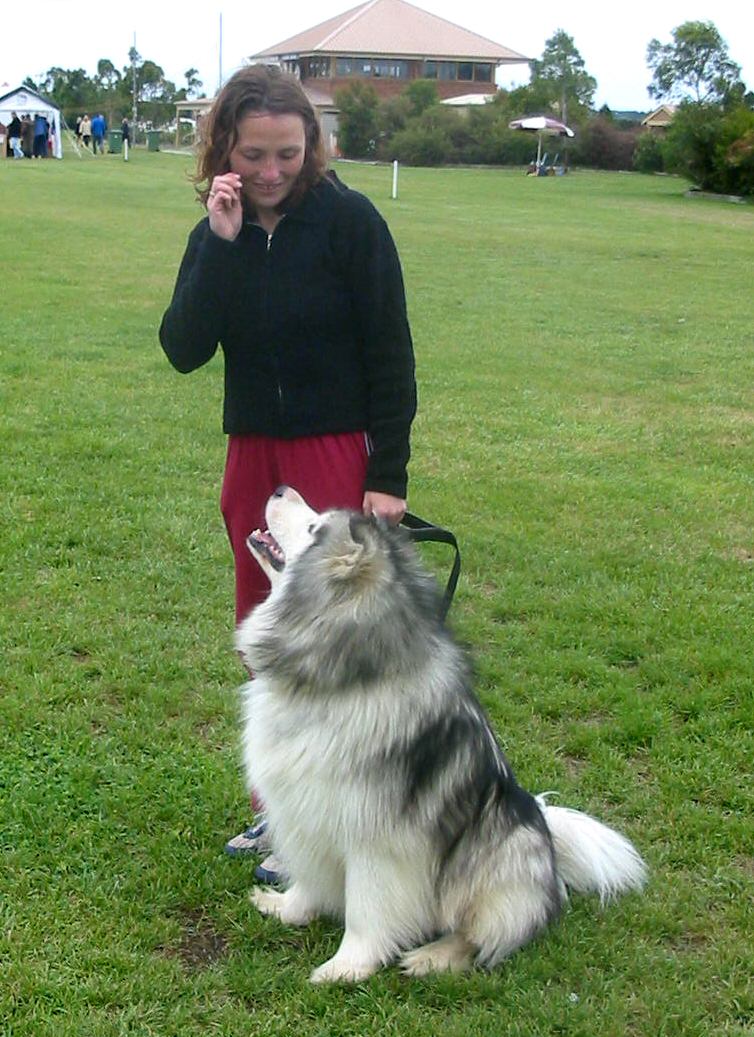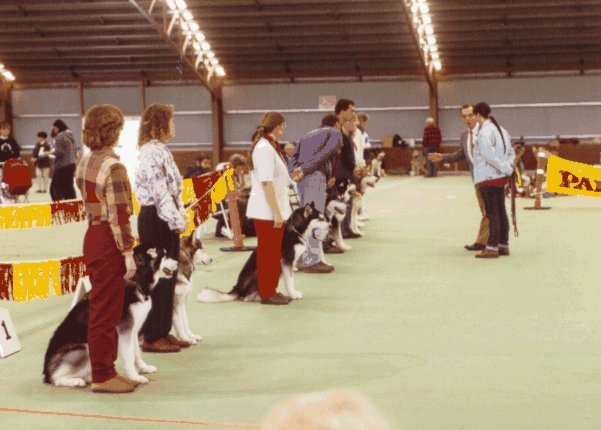Obedience and your Malamute
Obedience and the Malamute
The Alaskan Malamute can be a very independent and stubborn breed
that often won’t do anything without good reason. It is important
that all Malamute owners obedience train and socialize their dogs
from an early age for this reason, preferably with a reputable
obedience club or organization.
An untrained Malamute may be cute as a pup, but will soon turn into
a large, energetic, uncontrollable, destructive dog if left
undisciplined - hence the numerous phone calls the club receives
each week from people wanting to "get rid" of their adult Malamutes.
Often these people have not done their research into the breed or
been prepared to discipline, socialize or obedience train their
dogs.
It is very important early in your dogs life to establish yourself,
your family and any other human being as being higher in the pecking
order than your dog. You must show your dog that you are the
"pack-leader". This does not mean using physical punishment, but it
does mean that you have to earn your Malamute’s respect by being
extremely firm and letting him know that you mean what you say.
Once you have issued a command, don’t let him get away with not
doing what you have asked. Every time you let your Mal get his way
you are undermining your authority and you will end up with a dog
that thinks he’s the boss, which can be unpleasant to live with when
its a large, strong dog such as the Alaskan Malamute.
Obedience training, as well as teaching good manners and house
rules, should start as soon as you get your puppy.
We recommend that you and your Malamute attend a weekly all-breeds obedience club so that you can learn how to train your Malamute and, at the same time, socialize your Malamute with people and other dogs.
 Some
Basic Obedience Training Tips . . . . .
Some
Basic Obedience Training Tips . . . . .
- A dog is at its learning peak at 8 to 16 weeks of age. For this reason you should start your obedience training as soon as you get your pup.
- If you cannot find an obedience club that will accept puppies which have not yet finished their course of vaccinations, buy an obedience training book and start your training at home.
- Keep your training lessons at home short, 5 - 10 minutes a session for a puppy and 15 - 20 minutes a session for an adult. You will achieve much more in several short sessions than you will in one long session.
- Give basic lessons in a quiet place with no distractions. After your dog has learnt the basic obedience commands, introduce more distractions during your training sessions, e.g. train in a park where other dogs or children are playing.
- Keep your training sessions regular when you are beginning with your pup - train at the same time and in the same place. Training before feeding time is a good idea.
- Wait until one command is learnt before trying to teach another. Once your dog has learnt a command, revise it at the beginning and end of each successive lesson.
- Keep training interesting and fun - always do your lessons in a different sequence. Dogs (especially Malamutes) easily get bored going over and over the same thing in the same order.
- Any sort of lessons or training sessions should be a happy time for you and your dog - if you are losing patience, stop the lesson. Make sure you finish up on a positive note, e.g. something easy such as a sit, so that you can end with praise for your dog. This will keep the dog enthusiastic and happy to work for you.
- Don’t blame the dog for not doing what you are expecting it to, the handler is nearly always the one to blame.
- Get your dog’s attention before giving a command. Praise your dog when he looks at you for instructions, this is a sign that your dog is listening and considers you the "pack-leader".
- When your dog reacts correctly always respond with positive feedback in the form of praise, a piece of food or a pat. Remember to show your dog that you are pleased when it has acted correctly - never take correct behaviour for granted, especially when training a young pup.
- Use a tone of voice suited to the message you are trying to get across to your dog - the dog interprets much of what you are saying by the tone of voice used. Saying "Good dog" in an angry voice (it sounds silly but you do hear it done) gives the wrong message to the dog.
- Do not allow or encourage behaviours in your pup that you won’t want him doing when he is an adult. Behaviours such as mouthing, jumping up and pawing may be cute and tolerable when your Mal is a young pup, but can be dangerous, painful and frightening to other people when your dog is fully grown.
Make sure that your actions are always telling the dog that you are the one in charge. You can remind your dog that you are the pack leader in many simple ways. For instance:
- the dog should be the last one through the door/gate, he should never be allowed to barge in first;
- you and your family must always eat first, then feed your Malamute - never feed him at the dinner table while you are eating
- don’t let the dog sit at your level on the couch or bed - the dog’s place is on the floor
- if your dog is misbehaving stand over him - don’t crouch down to his level.
- When playing games don’t let your Mal "call the shots". If you play tug of war games (which we advise you not to) always make sure you win, and when playing "fetch" never go and get the ball yourself if your Malamute won't. If you keep control over the games you are reinforcing your leadership in a way that your dog will recognise.
- Never handle your dog roughly or angrily, always be firm but gentle.
- Never push down on your dog’s back, always make your dog sit by pushing down on the dog’s rump at the base of the tail, or drop by pushing downwards on the shoulders.
- A command is issued once only - if your dog hesitates to carry out your command, make your dog do as you have asked. By doing this you are actively showing the dog what it is to do when you issue that command.
Your Malamute may be cute and cuddly but don't be tempted to spoil him, you must earn your Malamute’s respect.
Taking
your Malamute to "School"
Remember that when you go to obedience school with your dog, YOU
are the one who will be receiving instruction on how to train your
dog - the dog is not there to learn from the instructor. For this
reason obedience classes usually last for about an hour - your dog
may not have such a long concentration span (especially a puppy) but
the handler should!
So, if you aren’t having much success with your obedience training,
don’t blame the obedience club or the dog - you will almost
certainly be the one doing something wrong. Ask your instructor for
positive feedback on your training technique if you can’t work out
where you are going wrong.
You are always welcome to bring your dog along to the Malamute
Activity Days or any of our events and ask about a particular problem you are
having with your Mal. There will almost certainly be someone who has
experienced (and hopefully overcome) your training problems and will
be happy to advise you on a possible solution.
We recommend any of the
Dogs Victoria
affiliated Obedience Clubs which are
inexpensive, are well equipped and have a number of instructors to
help you with any problems you may have.
Being a stubborn & independent-minded breed, it is important that
all Malamutes participate in obedience practice from an early age.
Most obedience clubs will accept puppies from 16 weeks of age,
however teaching good manners is important from as early as 8 weeks
of age so it
is up to the owner to start with basic obedience
at home as soon as the new puppy arrives.
The AMCV recommends any obedience clubs that are affiliated with
Dogs Victoria (VCA) as they are
fairly cheap to attend and usually have quite a few instructors with
experience with a range of breeds.
In particular, Malamute owners are encouraged to take
their dogs along to the
Rottweiler Club of Victoria obedience
sessions held on Tuesday evenings at Bulla and Wednesday evenings at
KCC Park at Lyndhurst. All dogs are welcome, no matter what age, whether you dog is registered
or not, well-behaved or uncontrollable!
If you would like assistance with any specific problems, or would
like some general advice about your Malamute, obedience equipment or
training, please contact us.
Dogs Victoria (VCA) Affiliated Obedience Clubs
For a list of the current Dogs Victoria affiliated clubs please visit the Dogs Victoria website.
Click on link below for PDF articles: